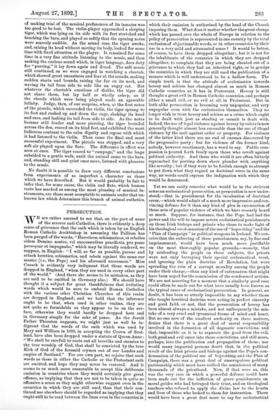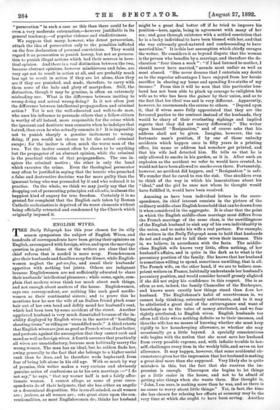PERSECUTION.
WE are rather amused to see that, on the part of some of the severer anti-Catholics, there is evidently a deep sense of grievance that the oath which is taken by an English Roman Catholic Archbishop in assuming the Pallium has been purged of the words, " HEereticos, schismaticos, et rebelles eidem Domino nostro, vel successoribus praedictis, pro posse persequar et impugnabo," which may be literally rendered, we suppose, in English : "I will, so far as possible, pursue and attack heretics, schismatics, and rebels against the same our master [i.e., the Pope] and his aforesaid successors." Miss Cusack is evidently very indignant that these words are dropped in England, "when they are used in every other part of the world." (And there she seems to be mistaken, as they are said to be omitted in Germany also.) We should have thought it a subject for great thankfulness that irritating words which would be sure to embroil Roman Catholics with the various other Christian Churches of this realm are dropped in England; and we hold that the inference ought to be that, when used in other realms, they are not quite so formidable as they appear to be on the sur- face, otherwise they would hardly be dropped here and in Germany simply for the sake of peace. As the Jesuit Father Thurston suggests, we might just as well be in- dignant that the words of the oath which was used by Mary and William in 1689, in accepting the Crown of Scot- land, have also been dropped under a statute of Queen Anne : "We shall be carefull to roote out all heretiks and enemies to the true worship of God, that shall be convicted by the true
• Kirk of God of the foresaid ctymes out of our Landes and empire of Scotland." For our own part, we rejoice that such words as these in either the Catholic or the Protestant oath are omitted, and hope they may never be restored. And it seems to us much more reasonable to accept this deliberate omission in countries where they would certainly give great offence, as implying that they are not to be taken in quite so offensive a sense as they might otherwise suggest even in the countries in which they are still used, than that their con- tinued use elsewhere should be regarded as implying that they ought still to be read between the lines even in the countries in
which their omission is authorised by the head of the Church imposing them. What does it matter whether the great change which has passed over the whole of Europe in relation to the policy of persecution is represented in one country by the total exclusion of objectionable words, or in other countries by their use in a very mild and attenuated sense ? It would be better, of course, to have them dropped altogether ; but it is not for the inhabitants of the countries in which they are dropped altogether, to complain that they are being cheated out of a grievance to which they had an inherited right, or to grudge the countries in which they are still used the publication of a menace which is well understood to be a hollow form. The simple truth is that the attitude of ecclesiastics towards heresy and schism has changed almost as much in Roman Catholic countries as it has in Protestant. Heresy is still thought a great evil in Roman Catholic countries, and perhaps either a small evil, or no evil at all, in Protestant. But in both alike persecution is becoming very unpopular, and very unpopular even with the ecclesiastics themselves. They no longer wish to treat heresy and schism as a crime which ought to be dealt with just as stealing or assault is dealt with. Indeed, the use of legal violence against heresy by rulers is now generally thought almost less excusable than the use of illegal violence by the mob against order or property. For violence of the latter kind there are no end of excuses discovered by the progressive party ; but for violence of the former kind, nobody, however reactionary, has a word to say. Public com- passion is poured forth freely upon those who revolt against political authority. And those who wield it are often bitterly reproached for putting down sheer plunder with anything like severity ; but if they were to be foolish enough to attempt to put down what they regard as doctrinal error in the same way, no words could express the indignation with which they would be denounced.
Yet we can easily conceive what would be in the strictest sense an ecclesiastical persecution, as persecution is now under- stood,—that is, punishment for the inculcation of doctrinal error,—which would admit of a much more impressive and con- vincing defence for it than any kind of plea in extenuation of those acts of popular violence of which we have recently heard so much. Suppose, for instance, that the Pope had had the power and the will to impose severe ecclesiastical punishments on those Irish bishops and priests who chose to make light of his theological condemnation of the use of " boycotting " and the "Plan of Campaign" as political weapons in Ireland. We con- ceive that the enforcing of these punishments, say, by fine and imprisonment, would have been much more justifiable on the most thoroughly popular grounds,—namely, that by misleading the people on these subjects, the priests were not only betraying their special ecclesiastical trust, and ignoring the plain doctrine of Revelation, but were spreading the ruin of a corrupt morality among the people under their charge,—than any kind of extenuation that might have been urged for the commission of the condemned actions. We are not asserting for a moment that a similarly good case could often be made out for what have usually been known as the typical cases of ecclesiastical persecution. In general, no doubt, it has been so utterly impossible to say whether those who taught heretical doctrine were acting in perfect sincerity and good faith or not, that the persecution of heresy has been almost always a mistake, and not nnfrequently the mis- take of a very cruel and tyrannical frame of mind and heart. But no one now of the smallest authority on these matters, denies that there is a great deal of moral responsibility involved in the formation of all dogmatic convictions, and that, impossible as it is to separate the good from the evil, both good and evil enter into these convictions, and still more, perhaps, into the publication and propagation of them ; nor would many impartial persons doubt that, in the political revolt of the Irish priests and bishops against the Pope's con- demnation of the political use of boycotting and the Plan of Campaign, there was a great deal of unscrupulous political partisanship which must have sullied the consciences of many thousands of the priesthood. Now, if that were so, this was the very case in which a powerful defence could have been made out for the infliction of grave punishments on moral guides who had betrayed their trust, and on theological teachers who refused to apply the divine law to the hearts and lives of those who looked to them for instruction. There would have been a great deal more to say for ecclesiastical
" persecution " in such a ease as this than there could be for even a very moderate extenuation,—however justifiable in its general tendency,—of popular violence and vindictiveness.
We suppose that many, however, who detest persecution, attach the idea of persecution only to the penalties inflicted on the free declaration of personal convictions. They would regard it as persecution to punish heresy, but not as persecu- tion to punish illegal actions which had their sources in here- tical opinion. And there is a real distinction between the two, because abstract opinions, however mischievous and false, are very apt not to result in action at all, and are probably much less apt to result in action if they are let alone, than they are if they are punished, and made, therefore, to carry with them some of the halo and glory of martyrdom. Still, the distinction, though it may be genuine, is often an extremely misleading one. What is the difference between inciting to wrong-doing and actual wrong-doing P Is it not often just the difference between intellectual propagandism and criminal action ? Yet is not the well-educated and well-to-do man, who uses his influence to persuade others that a fellow-citizen is worthy of all hatred, more responsible for the crime which the ignorant and destitute man commits when he indulges that hatred, than even he who actually commits it ? It is impossible not to punish sharply a genuine incitement to wrong- doing, if you would not choose to let the actual criminal escape; for the inciter is often much the worse man of the two. Yet the inciter cannot often be shown to be anything but the propagator of an abstract opinion, while the criminal is the practical victim of that propagandism. The one in- spires the criminal motive ; the other is only the hand which executes the crime. Even the theological persecutor may often be justified in saying that the heretic who preached a false and destructive doctrine was far more guilty than the ignorant being who was persuaded by it and who redaced it to practice. On the whole, we think we may justly say that the dropping out of persecuting principles sub silentio, is almost the happiest kind of augury for true freedom. Certainly it is no ground for complaint that the English oath taken by Roman Catholic ecclesiastics is deprived of its worst elements without being officially retracted and condemned by the Church which originally imposed it.



































 Previous page
Previous page